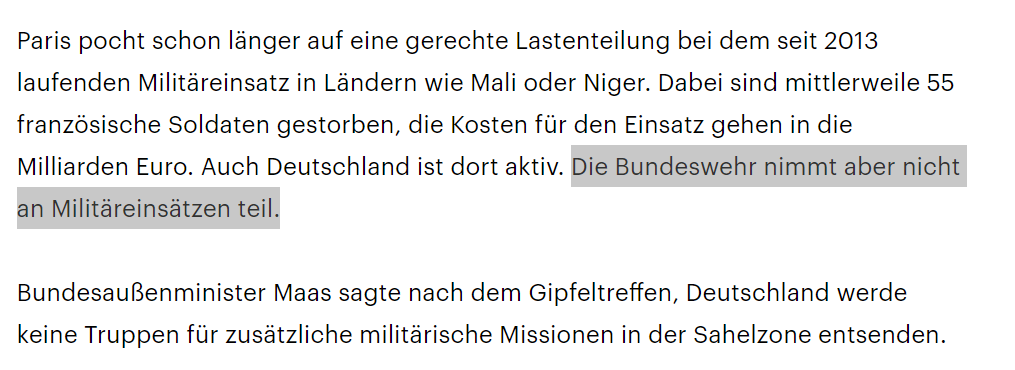
European efforts to train the security and defense forces of #Mali have stumbled. Based on our op-ed, here's a suggestion how they could become more effective (and ensure to manage risks better).
@IngoHenneberg @PayamGhalehdar and Robin Schroeder were my co-authors THREAD 1/
@IngoHenneberg @PayamGhalehdar and Robin Schroeder were my co-authors THREAD 1/

Since its inception in 2013, more than 14,000 soldiers and members of other security forces have attended @eutmmali1 courses.
Mali's armed forces alone comprise roughly 20,000. The EUTM Mandate includes training, education and advice. 2/
Mali's armed forces alone comprise roughly 20,000. The EUTM Mandate includes training, education and advice. 2/
EUTM is only one part of a broad national, regional and international approach to peace and security in #Mali and indeed the #Sahel region. Still, creating effective and legitimate defense forces is a crucial part of that approach. So far, it is failing. 3/
In 2020, @UN_MINUSMA Human Rights Division recorded more violations and abuses by the security forces than by extremist groups. The former were responsible for 530 documented violations, the latter for 469. 4/ 

So, not only did the Malian forces not protect civilians from those abuses, MINUSMA documented 269 arbitrary executions by them. If one considers that national forces often co-operate with intercommunal militias (responsible for most violations), the picture is even worse. 5/
@eutmmali1 does not have an easy job. As @denis_tull has pointed out repeatedly, reforming a military is very difficult when a large part is constantly deployed. It is easier and faster to transmit basic skills than change the whole security sector. 6/ academic.oup.com/ia/article-abs…
Last year, the EU conducted a major review of EUTM Mali. As a result, the current mandate stipulates a double extension: closer to the operations in Mali (decentralization) and extending to all G5 Sahel countries, particularly Niger and Burkina Faso. 7/ eutmmali.eu/the-new-mandat…
Because of the pandemic and the coup in Mali, the EU suspended activities for a while last year. So it has only started to implement the extension in the past six months. 8/ eutmmali.eu/an-expected-re…
The (unintended) result is that EUTM is providing more training at the tactical level just when documented human rights violations peaked. It literally provides shooting training to a force credibly accused of massive abuses. eutmmali.eu/opening-ceremo… 9/
So, what needs to change? Withdrawing EUTM Mali outright is not a sensible option at this time - Malians still need more effective and legitimate forces. But to become better, they need wholesale security sector reform #SSR. 10/
To be effective, training efforts need to be closely combined with #SSR. In #Mali, this particularly means three reforms:
1 More transparent human resources and logistics management
2 Fighting impunity
3 Parliamentary control of the security sector. 11/
1 More transparent human resources and logistics management
2 Fighting impunity
3 Parliamentary control of the security sector. 11/
The EU and the Malian government should, we argue, agree on joint obligations and mutual accountability for military training AND security sector reform. The agreement should include quantitative and qualitative indicators of success - and regress. 12/
It should be clear if specific, detailed steps are (not) taken on the reform side, training efforts would (not) continue. @eutmmali1 should stagger its training offer according to their risk of abuse: medical training can precede offensive tactical training, for example. 13/
We are clear that in the current situation, the EU should reduce its training efforts. Only once clearly defined progress has been achieved, it should gradually increase its activities again. If the conditions are right, this may ultimately even include operational mentoring. 14/
Clear and open communication will be important to make this approach a success. The EU should make its approach clear to the Malian population and include Malian experts and civil society representatives in its assessments of the reform efforts. 15/
Believe it or not, the opportunity for such a strategic change is good. On 19 March, @CoalitionSahel passed a roadmap to support the G5 Sahel countries in their communiqué adopted in N'Djamena in February. 16/ elysee.fr/emmanuel-macro…
The roadmap contains a commitment to structural security sector reforms along the lines we mentioned. The communiqué states that "Monitoring mechanisms will be put in place in order to ensure mutual accountability between actors" 17/ coalition-sahel.org/en/second-mini…
That is the chance. These national monitoring and accountability mechanisms should not only include civilian stabilization projects but also military and security efforts. They should be clearly time-bound and continuously reviewed. 18/
This is a suggestion for just one part of the international engagement in #Mali. The People's Coalition for the Sahel has a much more comprehensive report out today. 19/ static1.squarespace.com/static/5f524b4…
Our original commentary appeared in the German daily @welt. 20/ welt.de/debatte/kommen…
For a French version, see here. 21/21 moroccomail.fr/2021/04/11/com…
• • •
Missing some Tweet in this thread? You can try to
force a refresh






